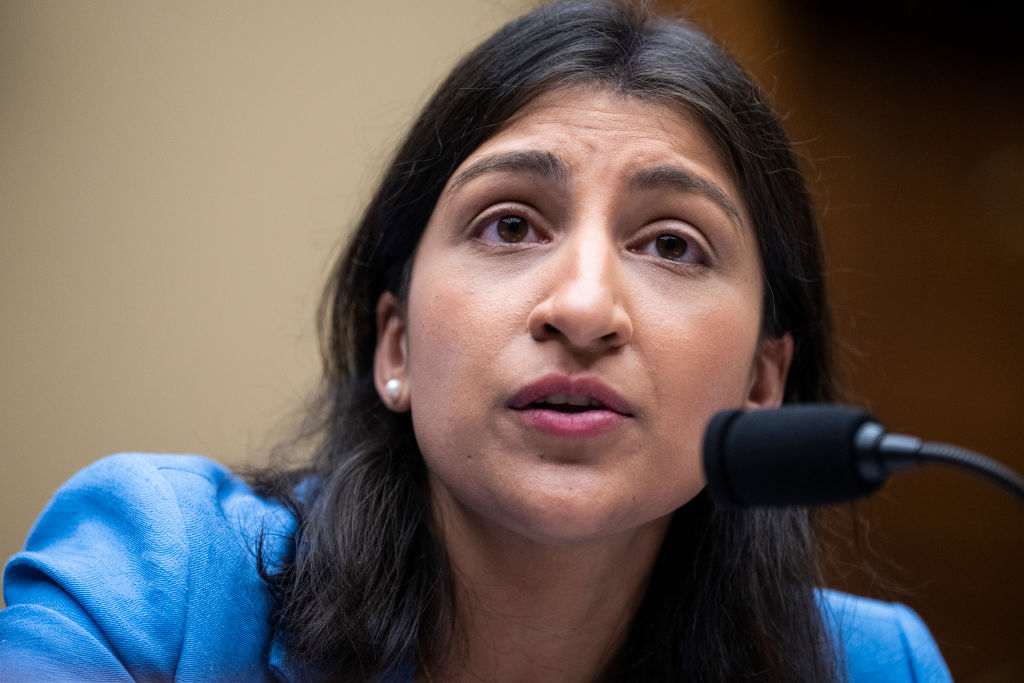In her recent testimony before the House Energy and Commerce Committee on April 18, Federal Trade Commission (FTC) Chair Lina Khan demonstrated a concerning lack of understanding of the U.S. tech sector’s importance to American economic and national security interests. She also exposed the FTC’s loose grasp on the threats posed by the People’s Republic of China’s (PRC) tech sector, which remains under the control of the Chinese Communist Party. Worse still, the FTC’s recent actions threaten to undermine U.S. interests and empower the PRC.
The FTC announced on March 30 that it would send agency officials abroad to implement and enforce the European Union’s Digital Markets Act (DMA). This law went into effect on November 1, 2022, with the goal of increasing competition in the technology sector. To achieve this goal, DMA targets several online platforms (overwhelmingly American ones) by designating them as technology sector “gatekeepers.” Gatekeepers are subject to rules that their competitors are exempted from, such as allowing third party access to hardware, software, and operating systems. DMA would also require “gatekeepers” to share intellectual property and trade secrets with their competitors. Leading Chinese tech companies are not expected to be in the scope of the DMA.
Khan’s comments reveal a startling willingness to support foreign policies that could harm American interests. She stated during her testimony that it is “good government” for the United States to “be cooperating” with foreign jurisdictions “to get to consistent [policy] outcomes.” Yet it is hard to reconcile DMA cooperation as a “consistent outcome” for the U.S. government, which expressed serious concerns about the law to the EU in 2021.
This is particularly concerning as it is Chinese companies, not the European companies the DMA seeks to empower, that stand to benefit from U.S. tech providers facing discrimination in foreign jurisdictions.
A recent study by the Center for Strategic and International Studies found that 16 percent of European companies surveyed would switch from an American tech provider to a PRC tech provider because of anticipated cost increases resulting from the implementation of the EU’s DMA, which the study estimates could range between $22 billion to $50 billion in “new compliance and operational costs.” The FTC’s support for such legislation serves only to fuel this trend, playing directly into the hands of the PRC.
In response to questioning from South Carolina GOP Rep. Jeff Duncan during the hearing about the FTC’s DMA announcement, Khan stated she is “proud of the international cooperation [of the FTC]” without providing specifics about her decision. Nor did she acknowledge, let alone agree with, Duncan’s repeated warnings about PRC tech firms being advantaged by DMA.
The FTC’s actions also signal an unwarranted expansion of its influence on matters typically addressed by the State Department and other agencies with greater expertise in international competition issues. This lack of clarity regarding who is leading the administration’s technology policy sends mixed messages to the private sector.
Notably, the same week the FTC announced its plans to send a delegation to help implement the DMA, the Office of U.S. Trade Representative Katherine Tai released its National Trade Assessment, identifying the DMA as a barrier to digital trade. This glaring inconsistency highlights the need for a coherent and unified approach to technology policy within the U.S. government.
It is crucial that the FTC and the Department of Justice’s Antitrust Division refrain from interfering in U.S. international digital policy, particularly when their actions could inadvertently support the PRC, America’s most significant geopolitical competitor. Instead, these agencies must focus on fostering a robust and thriving U.S. tech sector that can compete globally and protect American economic and national security interests. As a recent Wall Street Journal editorial on the FTC and Department of Justice’s actions aptly stated, “helping foreign governments undermine U.S. companies is bad government.”
U.S. policymakers must remain vigilant and ensure that the FTC and other agencies prioritize America’s best interests, rather than aiding the rise of the PRC’s tech sector. A strong, unified approach to technology policy is essential to maintaining America’s competitive edge and protecting its long-term security.







Please note that we at The Dispatch hold ourselves, our work, and our commenters to a higher standard than other places on the internet. We welcome comments that foster genuine debate or discussion—including comments critical of us or our work—but responses that include ad hominem attacks on fellow Dispatch members or are intended to stoke fear and anger may be moderated.
With your membership, you only have the ability to comment on The Morning Dispatch articles. Consider upgrading to join the conversation everywhere.